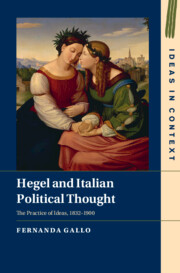Book contents
- Hegel and Italian Political Thought
- Ideas in Context
- Hegel and Italian Political Thought
- Copyright page
- Dedication
- Contents
- Figures
- Acknowledgements
- Introduction
- Chapter 1 The ‘Vico-Effect’
- Chapter 2 The Renaissance
- Chapter 3 The Risorgimento
- Chapter 4 The Ethical State
- Chapter 5 Hegelians in Charge
- Epilogue
- Bibliography
- Index
Chapter 1 - The ‘Vico-Effect’
Published online by Cambridge University Press: 11 December 2024
- Hegel and Italian Political Thought
- Ideas in Context
- Hegel and Italian Political Thought
- Copyright page
- Dedication
- Contents
- Figures
- Acknowledgements
- Introduction
- Chapter 1 The ‘Vico-Effect’
- Chapter 2 The Renaissance
- Chapter 3 The Risorgimento
- Chapter 4 The Ethical State
- Chapter 5 Hegelians in Charge
- Epilogue
- Bibliography
- Index
Summary
This chapter argues that Vico’s philosophy, Kant’s transcendentalism, and Victor Cousin’s eclecticism, were merged together by legal thinkers in Naples in 1830s and 1840s to forge a philosophical foundation for law based on universal principles and derived from the study of society. The adoption of Hegel in Naples transformed Vico’s philosophy of history into the dialectical unfolding of an absolute rationality identified with the idea of freedom. According to Neapolitan thinkers, Hegel’s philosophy of history became the realization of a universal reason that was acknowledged as the idea of freedom. Building on Vico, Hegel’s philosophy of history disclosed to Neapolitan legal thinkers the universal law that guided the progress of all nations. By drawing on Hegel and Vico the Neapolitan Hegelians were endeavouring to establish the principle of nationality as the expression of both inner liberty and the political liberty that unfolds within historical institutions.
Keywords
- Type
- Chapter
- Information
- Hegel and Italian Political ThoughtThe Practice of Ideas, 1832–1900, pp. 31 - 71Publisher: Cambridge University PressPrint publication year: 2024

